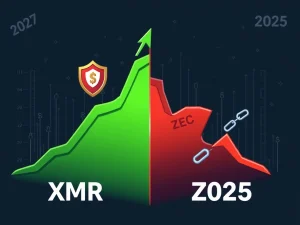Tornado Cash Trial: Landmark Legal Battle Reshapes Crypto Privacy

The crypto world is on tenterhooks as the high-stakes Tornado Cash trial unfolds, pitting digital privacy against claims of criminal facilitation. This landmark legal battle isn’t just about one cryptocurrency mixer; it’s a pivotal moment that could redefine the future of Ethereum privacy, open-source development, and the very foundations of decentralized finance. Will the creation of privacy tools be deemed a crime, or will the principles of decentralization prevail?
The Core of the Tornado Cash Trial: Privacy vs. Prosecution
The ongoing Tornado Cash trial of co-founder Roman Storm has entered a critical phase, with the defense passionately arguing that the Ethereum-based mixer is a legitimate privacy-enhancing technology. Ethereum core developer Preston Van Loon testified on July 13, likening Tornado Cash to encrypted messaging apps or VPNs – essential tools for safeguarding user privacy in a transparent blockchain environment. He openly admitted to using the mixer four times between 2019 and 2020 to obscure transaction details, asserting its necessity to protect users from potential targeting by malicious actors.
However, prosecutors are painting a starkly different picture. They allege that Storm retained de facto control over Tornado Cash’s funds through its smart contract architecture, challenging the defense’s claims of full decentralization. IRS Agent Stephan George testified that public blockchain data, combined with tools like Chainalysis Reactor, linked portions of stolen funds from hacker Shakeeb Ahmed to Tornado Cash in 2021. The prosecution’s core argument hinges on the assertion that Tornado Cash’s design inherently facilitated illicit activity, particularly its alleged ties to North Korean hackers like the Lazarus Group. This fundamental disagreement forms the crux of the legal battle.
Unpacking Ethereum Privacy: Why Do Tools Like Tornado Cash Exist?
Blockchain technology, while revolutionary, comes with inherent transparency. Every transaction is publicly recorded and traceable, which can be a double-edged sword. While beneficial for auditing and preventing fraud, this transparency also raises significant Ethereum privacy concerns for legitimate users. Imagine if every financial transaction you ever made was visible to the entire world – your spending habits, investments, and personal financial data laid bare.
- Transparency vs. Anonymity: Blockchains offer pseudonymity (addresses, not names), but advanced analytics can often de-anonymize users.
- Protecting Against Targeting: Individuals or businesses dealing with sensitive information might need to obscure transactions to avoid being targeted by criminals or competitors.
- Preventing “Tainting” of Funds: Legitimate funds could inadvertently receive “tainted” crypto from illicit sources, making them difficult to use. Privacy mixers aim to break these links.
The defense argues that Tornado Cash was built to address these genuine privacy needs, providing a shield for users who simply want to keep their financial activities confidential, much like traditional banks offer private transactions.
Crypto Regulation Crossroads: A Precedent-Setting Case for the Industry
This isn’t just a legal battle for Roman Storm; it’s a crypto regulation landmark that could profoundly reshape the digital asset landscape. Legal experts across the industry are watching closely, recognizing the potential for the verdict to set a powerful precedent for open-source development and decentralized applications.
Marisa Coppel, legal director of the Blockchain Association, has voiced concerns that a conviction could criminalize the act of writing and publishing open-source code. This would have a chilling effect on innovation in decentralized finance, as developers might hesitate to build tools that could be misused, even if their primary intent is legitimate. Conversely, an acquittal might reinforce the principle that creating neutral technology, even if it can be misused, is not inherently illegal. The outcome will influence how governments approach the regulation of decentralized protocols and the responsibilities of their creators.
Roman Storm’s Defense: A Battle for Decentralization and Intent
The defense team for Roman Storm is working to dismantle the prosecution’s claims, primarily by emphasizing the decentralized nature of Tornado Cash and the intent behind its creation. They argue that once the code was deployed, Storm, as a software developer, had no control over its misuse by third parties.
Key defense points include:
- Lack of Control: AnChain.AI investigator Philip Werlau testified that while Tornado Cash’s web interface blocked OFAC-sanctioned addresses, its command-line interface did not. Defense attorneys used this during cross-examination to underscore the impracticality of enforcing user compliance in a truly decentralized system where personal information is rarely provided.
- No Direct Link to Criminality: FBI Special Agent Joel DeCapua failed to establish a direct link between stolen funds from a specific victim (Hanfeng Lin) and Tornado Cash. While IRS Agent George later confirmed partial movement through the mixer, the defense asserts this doesn’t prove Storm’s culpability.
- Software Creator’s Liability: A core tenet of the defense is that software developers should not be held responsible for the actions of users who misuse their tools, drawing parallels to how car manufacturers aren’t liable for drunk drivers.
The defense aims to rest its case as early as July 28, with the prosecution expecting to conclude by July 25. Roman Storm has not yet decided whether to testify. The jury’s task is to determine whether Tornado Cash’s decentralized design absolves its creators from liability for its misuse.
What This Means for Decentralized Finance (DeFi) Going Forward
The verdict in the Roman Storm trial will send ripples throughout the entire decentralized finance (DeFi) ecosystem. DeFi relies on open-source, permissionless protocols, and the legal interpretation of developer liability could either foster or stifle innovation.
- Innovation vs. Compliance: A conviction might force DeFi projects to adopt more centralized controls or KYC (Know Your Customer) measures, potentially undermining the core ethos of decentralization.
- Future of Privacy Protocols: The development and deployment of new privacy-enhancing tools could face significant legal hurdles, potentially pushing such innovations offshore or underground.
- Regulatory Clarity (or Lack Thereof): While a verdict provides some clarity, it might also spark further legislative efforts to define the boundaries of decentralized technology and the responsibilities of those who build it.
The broader tensions between privacy rights and regulatory oversight, exemplified by Preston Van Loon’s prior legal battles against U.S. Treasury sanctions on Tornado Cash, are front and center. The outcome will undoubtedly influence future debates on the legal status and operational freedom of open-source crypto tools.
Key Takeaways from the Tornado Cash Trial:
- Privacy Under Scrutiny: The case highlights the ongoing tension between blockchain transparency and user privacy needs.
- Developer Liability: A central question is whether creators of decentralized software can be held responsible for its misuse.
- Regulatory Precedent: The verdict will set a significant precedent for how decentralized applications and open-source code are regulated globally.
- Future of DeFi: The outcome could dictate the trajectory of privacy-focused DeFi protocols and overall innovation in the space.
Conclusion: A Defining Moment for Crypto
The Tornado Cash trial is more than just a legal proceeding; it’s a defining moment for the cryptocurrency industry. As Roman Storm’s fate hangs in the balance, the world watches to see how the scales of justice will weigh privacy tools against claims of criminal facilitation. The jury’s decision will not only impact an individual but will also cast a long shadow, or a bright light, on the future of Ethereum privacy, open-source development, and the very spirit of decentralized finance. This case underscores the urgent need for clear regulatory frameworks that foster innovation while addressing legitimate concerns, without stifling the transformative potential of blockchain technology.
Frequently Asked Questions (FAQs)
Q1: What is Tornado Cash?
A1: Tornado Cash is an Ethereum-based cryptocurrency mixer designed to enhance transaction privacy by breaking the on-chain link between sender and receiver addresses. It pools funds from multiple users, shuffles them, and then disburses them, making it difficult to trace the origin of specific coins.
Q2: Why is Roman Storm on trial?
A2: Roman Storm, a co-founder of Tornado Cash, is on trial for charges including conspiracy to commit money laundering and operating an unlicensed money transmitter. The prosecution alleges that Tornado Cash facilitated illicit activities, particularly for sanctioned entities like the North Korean Lazarus Group.
Q3: What is the core argument of the defense?
A3: The defense argues that Tornado Cash is a legitimate privacy tool, akin to a VPN or encrypted messaging app, designed to protect users’ financial privacy on a transparent blockchain. They contend that Storm, as a software developer, cannot be held liable for the misuse of a decentralized, open-source tool by third parties.
Q4: How could this trial impact the cryptocurrency industry?
A4: The trial’s outcome could set a significant legal precedent for open-source development and decentralized finance (DeFi). A conviction might criminalize the creation of neutral privacy tools and stifle innovation, while an acquittal could reinforce the principle that software creators are not responsible for user misuse.
Q5: What are the implications for Ethereum privacy?
A5: The trial directly challenges the notion of privacy on public blockchains like Ethereum. If the prosecution’s arguments prevail, it could lead to increased pressure for privacy-enhancing tools to implement more centralized controls or be deemed illegal, potentially altering how users manage their financial confidentiality on the Ethereum network.










